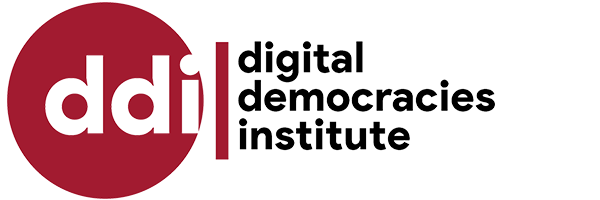Zack visited the Digital Democracies Institute to discuss “three remarkable things at root in Wikipedia: conflict consensus and creativity” and how they might be worth revisiting for discussions of online democracy. But first, he shared a bit of his past experiences with us that formed how he approaches his work today. He has always studied creative communities, beginning with the first ever academic study of Instagram, shortly before the platform exploded in popularity. He then went to the marketing scene, where he described it as “the dark arts of culture” where creative work can be weaponized for impact and manipulation. He brings this background to the world of information activism, as Wikipedia wanted to strengthen its global brand and social media. At the time the knowledge platform was losing visitors, contributors, and donors. They attributed this partly to a lack of brand relevance and positioning which made them less reflective of the world. These are the challenges that Zack began to take on at Wikipedia when he joined.
He calls Wikipedia an “internet ancient”, now 20 years old and pre-dating MySpace, Facebook, and YouTube. While initially intended as an academic, peer-reviewed online encyclopedia, the collaborative drafts were much more active and comprehensive than finished articles. So the early community decided to pursue a model of public, in-progress content. He explained that they decided to celebrate its unfinished nature in their branding, with the top of the globe an incomplete puzzle piece. It is in this history that Wikipedia became a knowledge base of small contributions coming together with the attractive postmodern idea that the “readerly is writerly” where the “readers write the books”.
Today, there are 1.5 billion users and more than 200,000 editors per month. They recognize there are considerable content gaps especially in gender, language of articles, and culture being represented and the need to increase editor numbers across the world. For example, 82 percent of biographies in English are men, correlated with the fact that 80 percent of editors identify as male. Zack also explained that there is Western cultural bias in the content, citing the example that there are more articles about the Netherlands than the entire continent of Africa. The problem goes beyond such numbers, as there are deeper problems that stem from favouring written and publishing culture, access to digital spaces and disparities in leisure time across geographies.
Despite these challenges, Wikipedia’s model facilitates conflict, consensus, creativity in its knowledge production, as Zack described. He highlighted their content model as the reason for this. For any given topic there is a single article for each language, even for controversial topics, and this must “bring together various positions and reflect a consensus view”, with dozens or even hundreds of edits on pages at times. When editors are in conflict with one another, admin oversight can be triggered and references and materials both parties can agree on must be included in order to resolve the conflict. “This is what is special about Wikipedia. Conflict moderates and makes the consensus model possible.” Zack also noted there is evidence that those who participate in this process eventually become less partisan, and this is the “Socratic dream” of Wikipedia.
Interestingly, it is not lack of consensus or diverging worldviews that are the main problem at Wikipedia, as is the case for so many other online spaces with open content creation. For Zack, the biggest threat is internal conflict on the future directions of the free knowledge “movement”, where there can be lots of misalignment. Some gravitate towards incremental investment in emerging regions, while others advocate for dramatic changes and major shifts in funding. Sometimes future allotment of resources can be seen as a zero-sum game, such as the question of whether to focus more on audio resources versus photographs. There are some frustrations around the fact that “prolonged debate benefits those who have their needs met today.”
However, these disagreements both internal and external are a sign of overall health. Zack explained that the “goal is not stability, unity, or an ended publication.” An article can be seen as “a dot of continuity that will continue to change.” Zack left us with questions such as, “How do you define the health of a knowledge community?”, and “How can we rethink the foundation of a corpus in its tensions between subjectivity and objectivity?”. This talk will continue to have us considering epistemological frameworks in our ongoing work with knowledge production in online communities.
